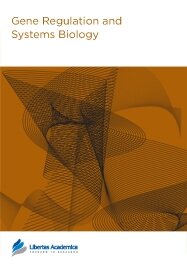

Publication Date: 28 Nov 2012
Type: Original Research
Journal: Gene Regulation and Systems Biology
Citation: Gene Regulation and Systems Biology 2012:6 151-168
doi: 10.4137/GRSB.S10371

Effects of high fat diet (HFD) on obesity and, subsequently, on diabetes are highly variable and modulated by genetics in both humans and rodents. In this report, we characterized the response of Goto-Kakizaki (GK) rats, a spontaneous polygenic model for lean diabetes and healthy Wistar-Kyoto (WKY) controls, to high fat feeding from weaning to 20 weeks of age. Animals fed either normal diet or HFD were sacrificed at 4, 8, 12, 16 and 20 weeks of age and a wide array of physiological measurements were made along with gene expression profiling using Affymetrix gene array chips. Mining of the microarray data identified differentially regulated genes (involved in inflammation, metabolism, transcription regulation, and signaling) in diabetic animals, as well as the response of both strains to HFD. Functional annotation suggested that HFD increased inflammatory differences between the two strains. Chronic inflammation driven by heightened innate immune response was identified to be present in GK animals regardless of diet. In addition, compensatory mechanisms by which WKY animals on HFD resisted the development of diabetes were identified, thus illustrating the complexity of diabetes disease progression.
PDF (3.20 MB PDF FORMAT)
RIS citation (ENDNOTE, REFERENCE MANAGER, PROCITE, REFWORKS)
Supplementary Files 1 (115.67 KB ZIP FORMAT)
BibTex citation (BIBDESK, LATEX)
XML
PMC HTML

The reviewing and editorial management of our paper was timely, thorough, and systematic. In particular the reviewers' comments resulted in a paper significantly more robust than the first version.
Facebook Google+ Twitter
Pinterest Tumblr YouTube